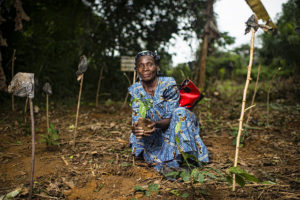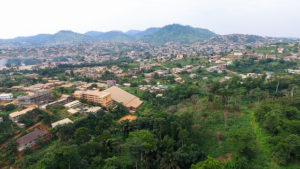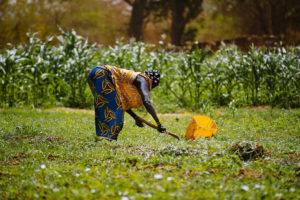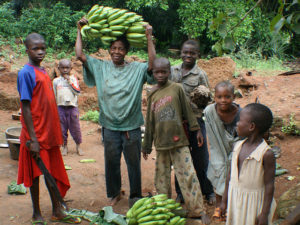
Rural women face a range of challenges across the environmental sector, including in forestry and agriculture. This has motivated the African Women’s Network for Community Management of Forests (REFACOF) to improve the situation by securing women’s tenure rights to land and forests.
Ahead of International Women’s Day, the CGIAR Research Program on Forests, Trees and Agroforestry’s (FTA) Gender Research Coordinator Marlène Elias sat down with REFACOF President Cécile Ndjebet to discuss the network’s successes and challenges, as well as her views on the role of FTA research in supporting transformative change for REFACOF members, their communities, and their environments.
Elias and Ndjebet spoke on the sidelines of the recent ‘Working across Sectors to Halt Deforestation and Increase Forest Area – from Aspiration to Action’ conference, organized by the Collaborative Partnership on Forests on Feb. 20-22, 2018. FTA supported the coordination of 10 of the total 16 thematic sessions at the conference, including leading the organization of a session on stakeholders, for which Ndjebet was a panelist, and co-organizing a session on science and research.
Cameroon-based Ndjebet is an agronomist and social forester who has been involved for many years in gender mainstreaming and advocating for women’s rights. She coordinates REFACOF – which was created in 2009 with 10 countries, and now covers 17 across Central Africa, West Africa and Madagascar – in the push for greater consideration of women’s activities and in aiming to influence policies and practices for greater gender equality.
Read more: FTA at CPF international conference
Watch: Cecile Ndjebet mobilizes mangrove restoration project on Cameroon coast
What does your network aim to achieve for the environment and for women’s lives?
Women’s lives and humanity depend on the quality of our environment. In our network, we aim to improve the environment as a whole, but we also think we should contribute to climate change mitigation, so we address climate change issues and try to improve the livelihoods of communities.
We want to improve the quality of the environment through activities in the field, on the ground, through the enabling environment, policies and legal arrangements, and with the development of livelihood activities. If we aim at improving the environment so we can address climate change, we need to contribute to decreasing deforestation and forest degradation but we also need to improve our agricultural practices and techniques. Of course, we also need to work with other actors to combine our efforts and tools.

For example, women in Burkina Faso, Cameroon, Congo, Côte d’Ivoire, Ghana or the Gambia are very much engaged in tree planting. They are working to improve the forest area, the forest surface, mangroves; they are involved in sustainable agricultural practices; they are also involved in education, information sharing and training among themselves.
Those who have more expertise in particular areas or issues train others. They also mobilize communities in general (men, women and youth) to increase consideration and awareness of the issues of climate change.
Read more: Women left on sidelines of decisions about forest management
What challenges have you confronted and what have been your successes?
Let me start with successes. The first one is having women on board – making sure women participate physically where decision-making occurs. We have started in a few countries, especially in REDD+ processes, to understand that if women are absent, things will fall on them. So we organize women at the very local level, subnational and national level to take part in REDD+ processes in some countries. We have realized that when women are part of decision-making processes they can really have a voice. They can voice their issues, and advocate and lobby to have their issues taken into account.
We have succeeded in influencing the way things are done. Now in the countries where we are, even the government knows that REFACOF said: “we need at least 30 percent women – please make sure women are on board”. You can see it in REDD+ documents like Readiness Preparation Proposals, national strategy documents, emission reduction documents. This is something we are really proud of and have to encourage: having women on board during decisions, planning, and implementation.

I would also like to share what we are doing with traditional chiefs and parliamentarians. To contribute to reforms in some countries, we needed to build strategic alliances. We understood that the challenges women are facing are not always because of a lack of policies or bad policies. Sometimes policies are neutral: they do not themselves exclude women. We do need more specific women-oriented policies, but the problem also lies in the practices, and these are linked to our cultural behavior.
So we understood this and realized that it was very important for us to work with traditional chiefs. We have started showing them where problems lie with customary law and where it is important for them to bring changes, because if women have secure access to land and to forests and forest resources, this will bring more value to all they are doing, and it is families and society that will benefit from that.
Then, we participated in forest and land reform processes. Of course, nothing is completely done, but at least we have succeeded in working with parliamentarians. When we submitted our advocacy document, we asked them to support it because the parliament is a key body in our country – drafting laws and making sure the law has a meaning for us. We have succeeded in doing that. Building on strategic alliances is key for women to achieve the change we are aiming at.
But we have challenges. The first one is insecure tenure, and the second one is funding. Women are doing a lot with so little and even that little is difficult to have and to mobilize. Women need resources to get more engaged, to improve our environment, to address climate change – and that is really lacking.
Also, when policies are neutral, most of the time women are left out at the time of implementation. So we have to work for gender-responsive policies and legal regulations to have ‘men and women’ clearly stated in the policy. If we only say ‘all Cameroonians, all citizens’, with our traditional way of doing things the women will be left behind. But if the policy says men and women, we only have to sensitize our male partners to this – and ask where the women are. It makes it less complex.
Read more: ACM levels the playing field for women and men in forest-adjacent communities
What role can FTA research play in supporting REFACOF and efforts to improve women’s lives and the environment?

I have a lot of expectations from researchers. Research should work to document what women are doing and share it worldwide. Our actions are local, but the impact is very high. If we put all the actions together, the impact is huge. If I have 200 women’s associations and each one restores 1 hectare of forest, we are at 200 hectares.
We need research to look at the social aspects of reforestation and the role of rural women: How can we document and value that role and what are the rewards? I would be very happy to see rural women recognized very openly at this type of conference, and that their role in addressing climate change in a specific area is recognized.
I went to Guatemala and met members of women’s associations and networks there. When I was talking with those rural women, I realized that whether African, Asian or Latin American, women are the same. They are facing the same challenges, the same problems. So how can we make it possible for them to share what they are experiencing across countries, across regions? Research can document, value and promote these experiences — and share worldwide. We need research to understand the why and the how of women’s involvement in environmental protection activities.
We also need research to help women technically, to succeed with what they are doing. When they plant trees, sometimes the survival rate is very low because of the techniques and tree species they are using. Research could look at how to improve the techniques and materials to ease women’s work.
Something very important is linking women at local, national, regional and global levels. Women’s situations are improving because we have networks like REFACOF and others in our regions. REFACOF is aiming at having a rural women’s platform that can take the lead on activities or concerns or issues at this type of forum. Not only talking on their behalf, but REFACOF can build women’s capacities in leadership, negotiation and advocacy so they can bring their issues to the highest level possible, at global level debates.
We are looking forward to the implementation of the newly adopted UN Strategic Plan for Forests (2017-2030), and hoping that rural women will have a place and a share in the implementation of the work program that will be developed.
Read more: Gender equality and social inclusion
This work forms part of the CGIAR Research Program on Forests, Trees and Agroforestry, which is supported by CGIAR Fund Donors.











